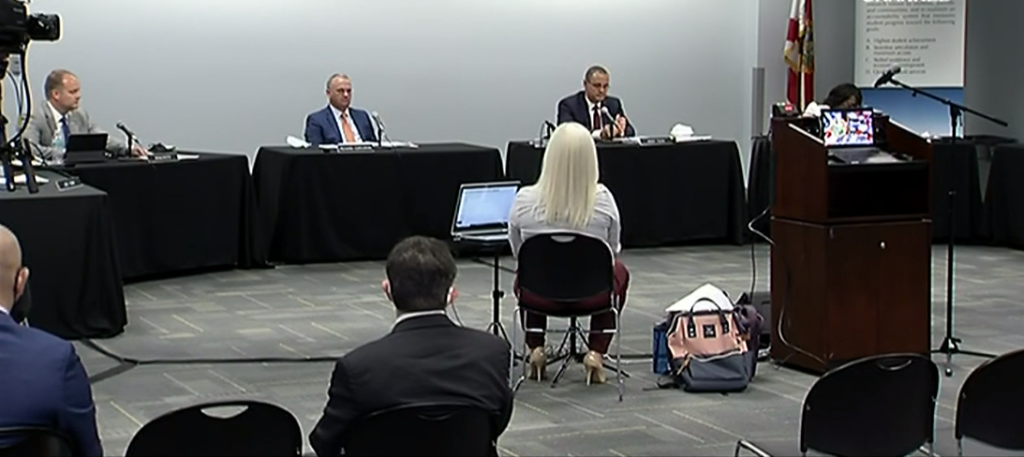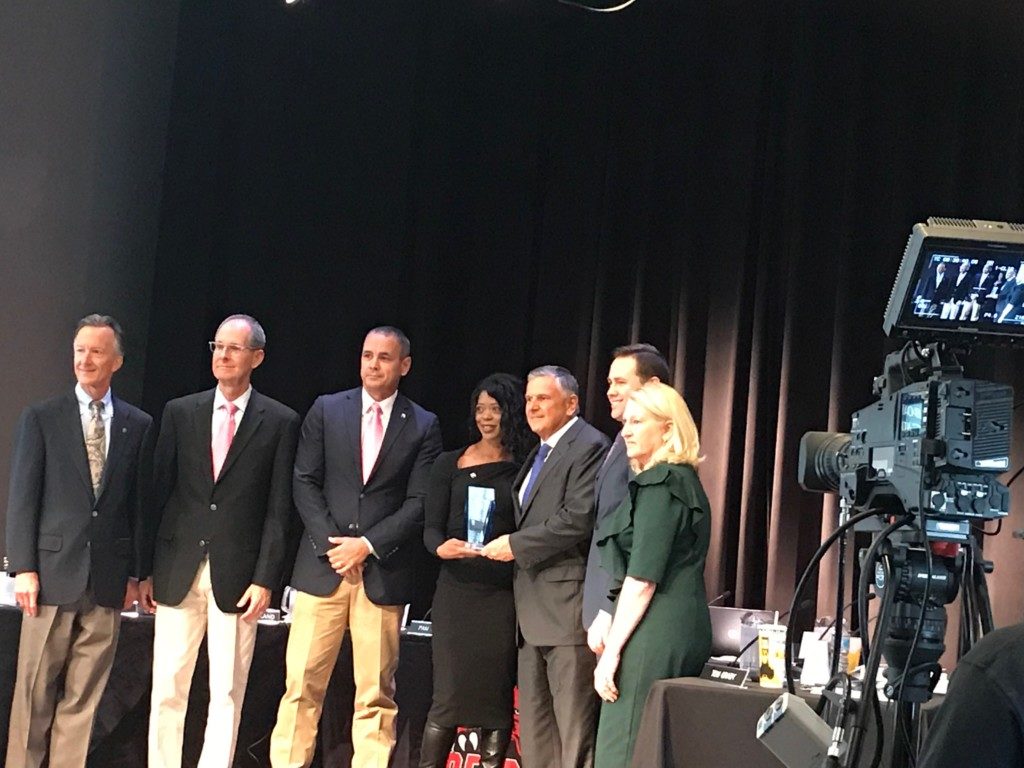 New rules: The Florida Board of Education approved several amendments during a meeting on Wednesday that will impact LBGTQ students. Three amendments and one new rule lay out guidelines to align with recently passed legislation regarding the usage of bathrooms, classroom instruction and admission of minors to adult performances. Two amendments address educators specifically, while two others detail guidelines for how districts must treat LBGTQ students who wish to go by a different name or use a bathroom that differs from their sex assigned at birth. Meanwhile, new academic standards were approved involving instruction about African American history after teachers statewide objected to the changes and asked the board to put the proposal on hold. Education Commissioner Manny Diaz Jr. pushed back on assertions by some groups that the standards “omit or rewrite key historical facts about the Black experience” and ignore state law about required instruction. State Rep. Anna Eskamani said the new standards were "inaccurate and a scary standard for us to establish.” Also, TikTok was formally banned in Florida schools. Florida Today. WUFT. Axios. WBBH. ABC Action News.
New rules: The Florida Board of Education approved several amendments during a meeting on Wednesday that will impact LBGTQ students. Three amendments and one new rule lay out guidelines to align with recently passed legislation regarding the usage of bathrooms, classroom instruction and admission of minors to adult performances. Two amendments address educators specifically, while two others detail guidelines for how districts must treat LBGTQ students who wish to go by a different name or use a bathroom that differs from their sex assigned at birth. Meanwhile, new academic standards were approved involving instruction about African American history after teachers statewide objected to the changes and asked the board to put the proposal on hold. Education Commissioner Manny Diaz Jr. pushed back on assertions by some groups that the standards “omit or rewrite key historical facts about the Black experience” and ignore state law about required instruction. State Rep. Anna Eskamani said the new standards were "inaccurate and a scary standard for us to establish.” Also, TikTok was formally banned in Florida schools. Florida Today. WUFT. Axios. WBBH. ABC Action News.
Palm Beach: The school district here will have to revisit its Baker Act policy after a federal court judgment. In a statement released by the Southern Poverty Law Center, it says the school district will consider the proposed revisions specifically for students who have disabilities. WPBF. Meanwhile, school leaders here decided to keep the Bible on public shelves. The discussion arose after Barry Silver, a civil rights advocate from Boynton Beach, formally objected in April to the Bible being on library shelves at Olympic Heights High in Boca Raton, where his son was a senior in the spring. The Palm Beach Post.
Manatee: As the first day of school approaches, the Bradenton Police Department will be hiring part-time crossing guards for the 2023-24 school year. Crossing guards will work two shifts daily with pay at $24 per hour. Requirements include frequent standing and walking, a valid Florida driver's license and passing a background investigation. Bay News 9.
Leon: A hearing officer picked by the county school district to make a recommendation on how to proceed with a challenge to the book "I am Billie Jean King" is telling school board members they should keep it on elementary school shelves. "It is my opinion that removing ‘I am Billie Jean King’ from elementary schools infringes on the rights of parents who want their children to learn about Ms. King and the many contributions she has made to our country," wrote that official, retired principal D.J. Wright, in her recommendation. The decision now goes to the school board, which will discuss the book challenge at its Monday meeting and vote on a decision Tuesday. The Florida Times-Union.
Flagler: The school board here gathered on Tuesday for a special meeting with members of the Florida School Board Association to discuss what it's looking for in a new superintendent. In April, the board chose not to renew former Superintendent Cathy Mittelstadt's contract in a 3-2 vote. Since then, the board has partnered with the FSBA to begin its search for the vacant position. The Daytona Beach News-Journal.
University and college news: State Sen. Randy Fine once floated the idea of a "shutdown" of University of Central Florida. But his next job might be as new president of Florida Atlantic University. Why Fine, who already announced a run for state Senate next year, would want to take the FAU president job is unclear. Orlando Sentinel. Eric Stewart, a Florida State University research professor of criminology, has been fired after an investigation into ongoing, questionable research allegations from the past four years. The decision was effective on July 13 and stated in a five-page termination letter to Stewart from James Clark, FSU's provost and executive vice president for academic affairs. Stewart held the position since 2007. “You demonstrated extreme negligence in basic data management, resulting in an unprecedented number of articles retracted, numerous other articles now in question, with the presence of no backup of the data for the publications in question,” Clark stated in the termination letter. Tallahassee Democrat.
Opinions on schools: Despite nearly $200 billion in emergency federal spending on K-12 schooling, students are doing worse than a decade ago, and lower-performing students are today less capable of doing math than they were 35 years ago. David Steiner, the 74th.

After years of failing grades, Warrington Middle School in Escambia County, Florida, received a D from the Florida Department of Education for the 2021-22 school year, leading the state Department of Education to issue an ultimatum to convert Warrington into a charter school.
Get it done. Now.
That was the firm directive that the Florida Board of Education gave Wednesday to Escambia County School District leaders who have yet to finalize a deal with a charter school company to take over struggling Warrington Middle School.
“I’m trying to contain the level of frustration that I have right now,” said Education Commissioner Manny Diaz Jr. “This school has been failing students for more than a decade, and it’s inexcusable that we’re still having adult conversations and not focusing on students.”
His comments followed an update showing that despite Warrington receiving D grades from the state since 2012, the Escambia County School District still has not finalized an agreement with Charter Schools USA to assume operations in 2023-24.
The state board said the school must be closed or turned over to a charter school partner if it did not receive at least a C grade. After a pandemic hiatus in grading, Warrington received a final grade of D in 2022. The state board then ordered the school closed or turned over to a charter for the 2023-24 school year.
District officials began negotiating in November with Charter Schools USA, which serves 75,000 students in five states. The 26-year-old charter school operator was the only organization to express interest in taking over the Title 1 school, where 80% to 90% of its approximately 600 students live below the federal poverty line.
The parties appeared to be headed toward a May 1 deadline to forge an agreement. However, negotiations hit a snag when district leaders said at an April 13 school board meeting that Charter Schools USA had sent a list of conditions for it to make a long-term commitment to the school.
Terms included a 15-year year contract between the district and Charter Schools USA and a 30-year contract with Charter Schools USA for control of the facility, with the charter organization paying the district $1 per year.
Additionally, new grade levels would be offered each year for the first four years under their control. Some of the grade levels would be zoned for the children living in the Warrington area, while others would be open to all students in the county. By the 2026-27 school year, Warrington would be a choice school for grades K-10, with no zoning.
School Board members expressed concern that a conversion to open enrollment would leave area students without a zoned neighborhood school, requiring them to be bused elsewhere.
Members also expressed concerns that handing over facility control for 30 years could put a future school board in a challenging position, especially because district school construction must meet state hurricane shelter standards. They further said they didn’t want to saddle a future board with debt if the charter company decides to leave.
Yet another concern was that Charter Schools USA had not submitted an application spelling out details of school operations.
Escambia Chairman Paul Fetsko assured state board members that the district is not anti-charter and sponsors nine “really good” charter schools.
“Our students are our number one priority,” he said. “We want them to learn wherever they can best be served. We want to work with Charter Schools USA, but the last-minute non-negotiables have been extremely difficult.”
However, Escambia school leaders garnered no sympathy from state officials, who called the concerns “excuses.”
Diaz said that as a state lawmaker, he included language in a bill that gave school districts flexibility from shelter requirements if the community already had enough shelter space so that should not be a concern.
State board Vice Chairman Ryan Petty criticized the district for expecting an application from Charter Schools USA, which it approved as a partner in the fall.
“So, you picked them and now you’re asking them to jump through bureaucratic hoops of an application? What’s the point?”
Petty said that during a tour of Warrington, he peeked into an eighth-grade classroom where algebra books sat on a shelf while a teacher’s lesson focused on basic arithmetic.
“You’ve been failing these students for over a decade,” he said.
Board member Esther Byrd said given the school’s poor performance, “Can you currently say to the parents of the children at Warrington Middle School that they’re succeeding, and they’re being taught because these numbers don’t say that. I don’t see how another option can be worse than what we have right now.
“This board has expressed a balance of urgency and grace, and I just want to say that as far as I’m concerned, we’re done with grace. So, we’ve got to get this done.”
Smith said the district is working hard to strike a deal.
“We’re not arguing; we’re not making excuses. What we’re saying is we need help getting this agreement across the finish line.”
State Board Chairman Ben Gibson called the repeated failure at Warrington “a bad dream” and said the district has little choice but to accept the terms.
“We’ve been desperate to get a charter operator in there,” he said. “Compromise is really the only option that we have. You don’t have a lot of negotiating power here.”
Charter Schools USA officials did not attend the state board meeting. However, Eddie Ruiz, the organization’s state superintendent, issued the following statement Wednesday to reimaginED:
“We were honored to be asked by the Escambia County School Board for help to turn around Warrington Middle School, which has been failing for decades. When we evaluated the significant problems at the school, we came up with a plan that points to the greatest opportunity for a successful turnaround.
“Unfortunately, the board found the terms to be unacceptable. We know what it takes to turn around failing schools, and we can implement those changes if we are given the ability to make them. One thing that is critical in this process is the cooperation and support of the authorizer, which we clearly do not have at this point.
“We believe all students deserve access to a high- quality education. At CSUSA, we have a relentless commitment to student greatness in school and in life.”
 Around the state: The state board of education was scheduled to meet to discuss whether 10 school districts are violating new state laws and rules relating to the instruction of race, gender identity and sexual orientation, a new tool in Hillsborough will show parents what changes from an attendance boundary analysis could mean, members of the Volusia United Educators teachers union showed up in red to deliver educator wish lists to the school board and book controversy in Brevard. Here are details about those stories and others from the state’s districts, private schools, and colleges and universities:
Around the state: The state board of education was scheduled to meet to discuss whether 10 school districts are violating new state laws and rules relating to the instruction of race, gender identity and sexual orientation, a new tool in Hillsborough will show parents what changes from an attendance boundary analysis could mean, members of the Volusia United Educators teachers union showed up in red to deliver educator wish lists to the school board and book controversy in Brevard. Here are details about those stories and others from the state’s districts, private schools, and colleges and universities:
Hillsborough: A new online tool from the school district here is showing parents what changes from an attendance boundary analysis could mean for their child's school. Some schools in this district have too few students while others have too many, so the district has a set of proposed plans to better utilize schools. But the impact of the plans vary for students. Any boundary changes, if approved, would take effect for the 2023-24 school year. "This is a very serious initiative," said Superintendent Addison Davis. ABC Action News.
Orange: The school system here is once again listed as the eighth largest school district for the 2022-23 school year. Based on an official count from the month of October, Orange County Public Schools reported 208,788 students. This figure is the highest number of students since before the pandemic began in 2020, when 212,401 students were reported for the 2019-20 school year. WFTV.
Brevard: The school board here wants books challenged in the district to be taken off library shelves and held behind the counter like adult magazines. But a policy needs to change before that occurs, and the district has begun the process of updating the policy. The board also narrowed down its top three candidates for interim superintendent who will take over on Jan. 1 from outgoing Superintendent Mark Mullins and begin work on reversing a controversial public speaking policy. Florida Today.
Volusia: Over 50 members of the Volusia United Educators teachers union, which represents about 3,500 district employees, showed up in red earlier this week to deliver educator wish lists to the school board. Requests included being paid what they were worth, proper time to take care of their mental health, paid maternity and paternity leave for staff and curriculum changes. Union president Elizabeth Albert wrote in an email that the employees were showing up "to send a message to the board that they are overwhelmed, exhausted, and that things need to change now." The Daytona Beach News-Journal. Meanwhile, families in this county's school district are demanding justice after groping and choking incidents. The Daytona Beach News-Journal.
Citrus: At a regular school board meeting earlier this week, members approved the final 2022-23 five-year work plan for the district as well as discussing the possibility of buying iPad insurance to save money on damage costs incurred. A main takeaway from the work plan: how the district is planning to compensate for student population growth at the elementary level in the next decade. Citrus County Chronicle.
Librarian guidelines: A state panel writing new guidelines for school librarians to follow when selecting books and other materials was supposed to meet earlier this week to finish recommendations. Instead, the session was canceled, sparking controversy. Tampa Bay Times.
LBGTQ policies: The state board of education was scheduled to meet Wednesday to discuss whether 10 school districts are violation new state laws and rules relating to the instruction of race, gender identity and sexual orientation. Letters were sent to each of the districts warning that their policies on matters such as pronoun use and restroom rules should be revised and are under scrutiny. Tampa Bay Times. Bradenton Herald. Some districts, which include Broward and Miami-Dade, have already learned they were in violation of the parental rights in education law. The Miami Herald. Many of these districts have a tumultuous history with state education officials on recent years when mask mandate disagreements during the pandemic led to administrative challenges, federal involvement and the withholding of certain school board salaries. “We’re not here to enforce anything, we’re here to listen to Chancellor (Jacob) Oliva as he makes his presentation,” Board Chair Tom Grady said in conference call meeting Wednesday. Florida Phoenix.
Superintendent shuffle: In the wake of election season, Florida school boards have booted out superintendents in districts across the state. Tallahassee Democrat. Lakeland Ledger. TC Palm.
Sandy Hook victims: The victims of this tragedy were remembered this week nationwide. NPR.
COVID-19 data: Charts were compiled to help better understand the impact COVID-19 had on teachers, students and schools. The 74th.
Lottery news: The state's lottery education contribution has reached $43 billion. Since its inception in 1988, public schools in Florida have received more than $23 billion, colleges and universities have received a total of more than $11 billion and more than $8 billion has been used to fund the Bright Futures Scholarship Program. WKMG.
Opinions on schools: It's been three years since the pandemic began and life is going back to pre-pandemic times, with the exception of one area: Education. Parents got a chance to get a close view into the education their children were being provided. One of those options is education savings accounts. Trish Wilger, reimaginED. When Oklahoma legislators approved a new K-12 open enrollment law last year, school choice advocates celebrated the reform. Despite its strong open enrollment law, Oklahoma is dealing with a problem facing other states with robust student transfer policies: how to ensure districts aren't arbitrarily defining capacity to keep neighboring students out. Christian Barnard, the 74th. Vickie Cartwright is superintendent of Broward County Schools until Jan. 24, and the district will continue looking for another superintendent. But this isn't a way to run the nation's sixth-largest school district. South Florida Sun-Sentinel.
 The state’s top education official today stopped short of announcing a decision regarding online learning programs for the second half of the 2020-21 academic year but stressed a commitment to education choice.
The state’s top education official today stopped short of announcing a decision regarding online learning programs for the second half of the 2020-21 academic year but stressed a commitment to education choice.
“The governor will take nothing less than full parental choice,” Richard Corcoran said during the Florida Board of Education meeting. “From the top down in this state, that will absolutely happen. There is no flexibility for anything but that.”
Corcoran said the department is continuing to work with all stakeholders and expects to make an announcement at the end of the month.
His remarks followed rumors that he would use the board meeting to announce a final decision on whether to end a July emergency order that allowed districts to offer online remote learning programs that tied students to their schools. The order promised full funding to districts based on student enrollment if they also provided in-person instruction five days per week to families who wanted it.
The order also temporarily waived a provision in the law that required K-12 students attending private schools on scholarships to receive instruction at brick-and-mortar schools as a condition of receiving state financial aid. The waiver drew sighs of relief from private school leaders who feared some families’ choice to pursue online learning would result in the loss of scholarships for their students.
The order is set to expire Dec. 31, leaving school officials and families uncertain as to how a decision would affect their fate when instruction resumes in January. A decision not to extend the order would force students at public and private schools back to campus, though they could leave their district schools and enroll in asynchronous e-schools or Florida Virtual School if they want to continue online instruction.
Board member Michael Olenick said any decision should be consistent with school choice, adding that his fifth-grade grandson who attends an online program tied to his district school is thriving.
“He has daily interactions with his teachers and his classmates,” Olenick said. “If you take that away from that fifth-grader and force him to Florida Virtual School, he will lose that sense of community; he will lose that daily interaction.”
The Florida Association of District School Superintendents also encouraged Corcoran to extend the order through the rest of the school year.
“We agree with Commissioner Corcoran and the governor that face-to-face instruction is the best way to deliver instruction,” the group said in a statement. “However, there are some parents and students who do not want to return to school while we continue to deal with the challenges of COVID-19. Continuing the innovative learning model for the remainder of the 2020-21 school year with full funding will allow districts to provide direct instruction for all students, including our most vulnerable, in these trying times.”
Wakulla County Schools Superintendent Robert Pearce, acting as spokesman for the superintendents’ group, said the online programs developed during the pandemic will benefit students long after it ends.
“There were good things that came of that,” he said. “We have every intention of continuing our district learning platform.”
 Beginning this school year, Florida public school districts will be required to report to the Florida Department of Education how many families they have informed of the availability of a scholarship for victims of bullying.
Beginning this school year, Florida public school districts will be required to report to the Florida Department of Education how many families they have informed of the availability of a scholarship for victims of bullying.
The Florida Board of Education approved the changes earlier today as part of its consent agenda, typically reserved for non-controversial items. The measure is included in rule changes that govern the Hope Scholarship.
Prior to the rule change, school districts were required to inform parents about the Hope Scholarship within 15 days after a bullying incident was reported and provide the parent with a completed Hope notification form verifying that the incident was reported. The form was needed to start the scholarship application process.
But 71 percent of Hope parents surveyed by the Learning Systems Institute at Florida State University said they learned of the scholarship through other means, such as private schools, internet searches and social media. Two-thirds disagreed or strongly disagreed that the incidents were investigated in a timely manner, and many expressed frustration with district officials who they said didn’t know the legal requirements or didn’t appear to want to follow them.
Former Florida House Speaker and now Florida Education Commissioner Richard Corcoran spearheaded creation of the Hope Scholarship in 2018. Students are eligible if they report being victims of bullying or similar incidents, including assault, battery, hazing, harassment and sexual misconduct. They can use the scholarship to attend private schools or to transfer to another public school.
At present, 429 students are using a Hope Scholarship, the first of its kind in the United States, at private schools, even though tens of thousands fall into the eligibility categories. State officials projected in 2018 that as many as 7,000 students would use the scholarship, worth about $7,000, annually.
Hope Scholarships are funded by individuals who contribute up to $105 in return for sales tax credits on motor vehicle purchases. So far this year, $60.8 million has been contributed. By law, unused Hope funds can be used for the Florida Tax Credit Scholarship for lower-income students.
Both scholarships are administered by Step Up For Students, the nonprofit that hosts this blog.
 As Florida officials prepare to discuss reopening brick-and-mortar schools in August, stakeholders urged members of the Florida Board of Education on Wednesday to use caution and involve health experts.
As Florida officials prepare to discuss reopening brick-and-mortar schools in August, stakeholders urged members of the Florida Board of Education on Wednesday to use caution and involve health experts.
In comparing the reopening to flipping a light switch, Education Commissioner Richard Corcoran said he plans to “use a dimmer switch” approach. In addition to safety, he said, priorities include eliminating inequities that were exacerbated during the pivot to distance learning as well as mental health issues and food insecurity.
“We’ll be working though what these impacts are,” he said.
Details of the Florida Department of Education’s COVID-19 Education Recovery Plan outline call for using the state’s education slice of the federal CARES Act relief money for extended summer programs as well as extended school year programs and wrap-around programs to catch up students who fell behind during distance learning.
Congress has allocated $16.5 billion to the U.S. Department of Education to assist state and local education agencies in dealing with issues related to COVID-19.
Corcoran’s report also called for money to be dedicated to extended online learning, refreshing or replacing electronics that were used during the spring, and an infrastructure for future digital needs.
Board member Michael Olenick urged Corcoran to be proactive.
“I don’t think we should wait for the federal dollar figure and then accept it,” he said. “We should develop that figure and present it to the federal government.”
Corcoran’s report came as representatives from the Florida Association of District School Superintendents presented its recommendations for reopening.
The superintendent group’s recommendations, presented by Pinellas County Schools Superintendent Michael Grego, include forming a statewide “pandemic education response team” composed of medical professionals across Florida with guidance from the federal Centers for Disease Control and Prevention.
“The statewide pandemic education response team may need to consider a combination of social distancing/group gathering and personal protective measures/screening protocols to best mitigate exposure to COVID-19 while planning for a return to school that ensures the safety and well-being of all stakeholders,” the report said.
Board vice chairwoman Marva Johnson wondered what that would look like.
“Are we looking at split days, staggered days?” she asked.
Grego said the superintendents have a meeting Thursday with medical professionals, including public health specialists, pediatricians and psychiatrists.
Board members took no votes on reopening plans but expressed support for Corcoran’s recommendations and for Gov. Ron DeSantis’ handling of the pandemic.
“I think our governor is doing a heck of a job handling this situation and trying to get our economy going again,” Chairman Andy Tuck said.
In other business, board members, acting as the trustee board for the Florida Virtual School, heard a brief update from its CEO, Louis Algaze, who said the nonprofit school system had reached its goal of boosting capacity to serve 2.7 million students by May 4.
“Should we see any resurgence in COVID-19, we’ll be available to assist,” Algaze said.
 Editor's note: This is a developing story; watch for updates.
Editor's note: This is a developing story; watch for updates.
Like many states, Florida has quickly ramped up its online education offerings to temporarily replace brick-and-mortar schools that were closed in response to the COVID-19 virus.
But those efforts are about to receive an injection of rocket fuel that will take virtual learning to new heights.
Florida Virtual School (FLVS), the state’s online K-12 school, is seeking $4.3 million in technology upgrades that will boost its capacity from its current 170,000 students in district, charter and private schools to 470,000 students by April 17 – eventually expanding to 2.7 million students by May 4.
Founded in 1997, FLVS is a publicly funded non-profit that operates as its own $240 million school district. It served 215,505 students in 2018-19, which included 5,540 who were enrolled full time and 209,965 who were external learners. All Florida public high school students are required to take at least one virtual class, and many choose FLVS as the provider. Its students perform as well as, or even better than, other students in Florida in most Advanced Placement course exams.
That existing infrastructure, years of experience and track record of success have given Florida a leg up on other states that are scrambling to launch online education programs to fill the gap left by schools closed for public health reasons.
The latest FLVS represents a highly ambitious expansion of its course offerings and capacity to meet expected demand as school districts around the state establish their own online-learning programs.
FLVS will provide up to 100 digital courses on various digital platforms for free to all Florida schools through June 30. They will include Mathematics, English Language Arts, History, Science, electives, Advanced Placement and Career & Technical Education courses.
According to Tania Clow, spokesperson for FLVS, 2.7 million students are the estimated maximum capacity for the servers after they are upgraded. That is close to the total number of K-12 students enrolled in Florida district schools, but students in charter and private schools are also eligible to participate.
The Florida Board of Education is expected to approve the proposal at its meeting Wednesday.
This post has been updated from the original.
by News Service of Florida staff
State Education Commissioner Pam Stewart said Tuesday that she will be stepping down from her post on Jan. 8.
The decision, announced in a letter to state Board of Education members, marks a reversal from late October when Stewart reached agreement with the board to remain for another year.
“It is with bittersweet feelings that I submit my letter of resignation,” Stewart wrote.
Stewart, who has been commissioner since 2013, said she originally agreed to stay for another year in order to promote “a promising path to continuing achievement for our students” and to provide an orderly transition with the new governor.
“While those may have taken up to a year, in light of recent election results and announcements, it seems we have the capacity for both of these goals now,” she wrote. “Therefore, I am returning to my original plan of retiring effective Jan. 8.”
Stewart’s retirement marks the end of a 39-year career as an educator, where she served as a teacher, principal and administrator.
Marva Johnson, chairman of the state board, said Stewart “has dedicated her life to serving the people of Florida and ensuring that every student has the opportunity” to succeed. “Throughout her career, she has been a fearless champion for Florida’s students, and Florida is a national education leader due in large part to her service,” Johnson said in a statement.
The Board of Education, which is appointed by the governor, will select a new education commissioner. The Tampa Bay Times has reported that former House Speaker Richard Cocoran, R-Land O’Lakes, is a top contender for the job under incoming Gov. Ron DeSantis.

Gary Chartrand (third from right) receives an award during his final meeting as a member of the Florida Board of Education
In his final meeting after serving nearly eight years on the Florida Board of Education, Gary Chartrand on Thursday used the occasion to speak of parental choice.
“To me, education is as important as oxygen,” said Chartrand, who was appointed by Gov. Rick Scott and served two terms. “A great education is not only a privilege, but a right. ... The potential to live the American dream is not just for a few, but for all. That is why we need to fight for all educational opportunities for students to reach their potential. Choice is important. The more choice we have, the more freedom we have.”
Chartrand is executive chairman of Acosta, a North American sales and marketing firm in Jacksonville, and is credited with bringing KIPP charter schools to Florida. He also founded the Chartrand Foundation, which provides funding to public schools in lower-income neighborhoods.
Board member Michael Olenick said Chartrand played a huge role in “forging our education policy.”
And Education Commissioner Pam Stewart said Chartrand worked to always represent the student.
“I have to say you make those decisions with a student in mind,” she said. “No matter where pressure comes from, you hold firm and you demonstrated some of my favorite words: strength, courage and encouragement.”
Chartrand said he tried as a board member to emphasize the importance of educational choice.
“Not every school is going to fit for the child, and I think we need to empower parents to make those decisions,” he said.
 Board's budget request: The Florida Board of Education's formal budget request to the Legislature asks for a $673 million boost in funding for the 67 school districts that includes $200 more in per-student funding and a $100 million increase in the safe schools initiative. Of that total, $170 million would be new funding from the state and the rest would come from increases in local school property tax collections. The board also is asking for $67.5 million for the school guardian program, and ignored one member's call to let districts use unspent funds from the program for other security measures. The budget request now goes to the Legislature for consideration. News Service of Florida. Politico Florida. Gradebook. Meanwhile, the Joint Legislative Budget Commission officially rejects requests to make $58 million in unused funds from last year's school guardian program available for districts to spend for resource officers and other security measures. TCPalm.
Board's budget request: The Florida Board of Education's formal budget request to the Legislature asks for a $673 million boost in funding for the 67 school districts that includes $200 more in per-student funding and a $100 million increase in the safe schools initiative. Of that total, $170 million would be new funding from the state and the rest would come from increases in local school property tax collections. The board also is asking for $67.5 million for the school guardian program, and ignored one member's call to let districts use unspent funds from the program for other security measures. The budget request now goes to the Legislature for consideration. News Service of Florida. Politico Florida. Gradebook. Meanwhile, the Joint Legislative Budget Commission officially rejects requests to make $58 million in unused funds from last year's school guardian program available for districts to spend for resource officers and other security measures. TCPalm.
Charter rejection overturned: The Florida Board of Education overturns the Leon County School Board's rejection of a charter school's application. The decision means the Tallahassee Classical School will be allowed to open in the 2019-2020 school year. Leon school board members unanimously denied the charter's application because they felt the school did not reflect the community's diversity and that it would discriminate against disabled students. But the state BOE sided with the Florida Department of Education's Charter School Appeal Commission, which ruled that the Leon board did not have good cause to reject the application. It's the second time this summer that the board has overruled local decisions to deny charter schools' applications. redefinED. (more…)